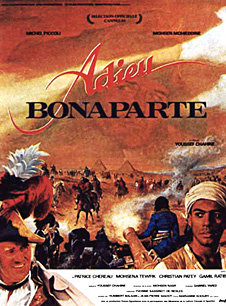FAREWELL BONAPARTE / Adieu Bonaparte
West Coast Premiere (Restored Film) • Historic drama • France, Egypt, 1985
DCP • 2.35 • Dolby • Color • 114 min
Directed by: Youssef Chahine
Written by: Yousry Nasrallah, Youssef Chahine
Cinematography: Mohsen Nasr
Film Editing: Luc Barnier
Original Score: Gabriel Yared
Produced by: Humbert Balsan, Jean-Pierre Mahot (Lyric International) Marianne Khoury (Misr International), Claude Berri (Renn Productions), TF1 Films Production.
Cast: Patrice Chéreau (Bonaparte), Michel Piccoli (Caffarelli), Mohsen Mohiedine (Aly), Hassan Hussein (The father), Mohsena Tewfik (The mother), Mohamad Hatef (Yehia)
International Sales: TF1 Studio
COLCOA is pleased to present this beautifully restored historical fresco from Egypt’s most celebrated filmmaker, Youssef Chahine. In 1798, the Turks have retreated and Napoleon’s army occupies Egypt. Arriving with the science expedition, General Caffarelli (Piccoli) falls under the spell of Egypt’s exotic aromas and people, especially Aly and Yehia, two young and idealistic Egyptian brothers, both refugees in Cairo, and both fascinated by Caffarelli’s extravagance and worldliness. While Napoleon, in a ferocious turn by Patrice Chéreau, sells his military adventure as liberation, Aly and Yehia see it as trading one oppressor for another, and seek ways to resist. Caffarelli, torn between his passions and his duty, must decide whose side he is on. Alternating between historical landscape and intimate portraiture, Farewell Bonaparte paints a prophetic picture of Egypt’s strained relationship with the West.
In 1985, writer/director Youssef Chahine was at the peak of his career. Just two years before, he had been invited to Cannes as a jury member. Now he was back presenting his 28th film, a big-budget opus he’d hoped would consolidate his growing international reputation. Instead the film was met with boos and attacked as anti-French. Today, Chahine’s work is being reassessed, and history seems to have vindicated his most pessimistic intuitions about the Middle East. Chahine’s prolific career began at the Pasadena Playhouse, where he studied acting. Never shying from controversy, his films tackled topics from repressed homosexuality to globalization. Chahine was given a lifetime achievement award in 1997 at Cannes, 46 years after his first appearance there. He died in 2008. This restoration is part of an ambitious effort by partners including La Cinémathèque française, the CNC, and the Franco-American Cultural Fund to restore and conserve Chahine’s entire body of work.











